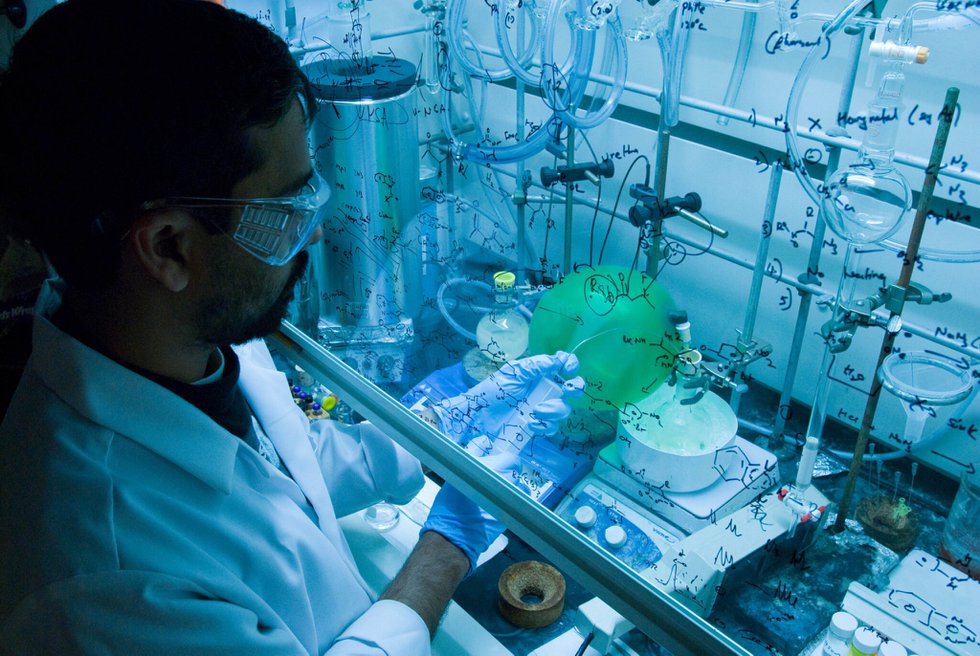Breakthroughs in chemistry will play a crucial part in solving many of the world’s most complex challenges, such as finding a cure for Alzheimer’s disease, cleaning up the world’s water supply or traveling safely to Mars.
Now thanks to major philanthropic commitments by the Robert A. Welch Foundation and Jon Hagler ’58, Texas A&M University’s Hagler Institute for Advanced Study will bring some of the world’s top chemistry researchers to campus. These leading scholars will work with Texas A&M faculty and students to further foster an innovative research culture that will position the university to be at the forefront of chemistry.
Each of these contributions are earmarked for specific but complementary purposes. The Welch Foundation’s $10 million grant will create the Welch-Hagler Fellows, who will be selected from national academy-level researchers in chemistry and allied fields where advances in chemistry enable multidisciplinary research. “To create a partnership like this with Texas A&M’s Hagler Institute is a compelling opportunity for the Welch Foundation,” said Fred Brazelton, chair of its Board of Directors. “With this funding, we hope to make a meaningful and enduring impact on the students, faculty and future research at the institute.”
Hagler’s $5 million matching investment establishes an endowed chair position that will provide financial support to a Welch-Hagler Fellow who comes to Texas A&M for up to one year to collaborate with faculty and students. “Texas A&M’s chemistry department is nationally ranked,” Hagler said, “and this is an opportunity for it to get even better.”
Additionally, the university has allocated $200,000 per year for at least 10 years to support fellowships for graduate students working directly with the Welch-Hagler Fellows. “These fellowships enable our world-class faculty to pursue their cutting-edge research while also investing in the future through supporting graduate students who will go on to expand the field,” said Dr. Alan Sams, executive vice president and provost for Texas A&M University. “Partnerships like the Welch-Hagler Fellows enable Texas A&M to amplify and broaden the reach of our research impact.”
Overall, this multimillion-dollar investment will enable the institute to build incredible synergy that will enhance faculty research productivity as well as graduate and undergraduate education. And given the far-reaching nature of chemistry and allied interdisciplinary research, the Welch-Hagler Fellows will accelerate researchers in numerous academic units, including chemistry, chemical engineering, biomedical engineering, materials science, medicine and biomedical sciences.
Tyson Voelkel ’96, president and CEO of the Texas A&M Foundation, expressed his gratitude for the monumental contribution. “It’s incredibly exciting to visualize the opportunities this funding will enable at Texas A&M,” he said. “Aggieland will be home to industry-leading research that will build a brighter future for our world. The Foundation’s gratitude cannot be overstated for the transformative impact it will make for our university.”
Bringing More World-Class Minds To Texas A&M
The Hagler Institute uses an innovative model to invite the best research minds in the world to engage with Texas A&M by having tenured faculty members who work in departments with graduate programs nominate world-class researchers for a Hagler Fellowship.
A committee of Texas A&M’s senior faculty members evaluate candidates’ scholarly work as well as their commitment to mentoring young faculty and students. “We want to further enhance our legacy of accelerating young people and collaboration across disciplines,” Junkins explained.
Once the committee’s decision is finalized, Junkins offers the approved scholars what he describes as “the mother of all sabbatical opportunities” for the researcher to come to Texas A&M. More often than not, his invitation is accepted.
Since its inception in 2010, the Hagler Institute has attracted 116 Hagler Fellows and 10 Distinguished Lecturers to the university. The Hagler Fellows have included six Nobel Laureates, two Wolf Prize winners, an awardee of the Hubbell Medal in Literature for Lifetime Achievement, an Academy Award winner, and recipients of the National Medal of Science, the National Medal of Technology and Innovation, the National Humanities Medal, the State Prize of Russia, and a lifetime achievement award in architecture.
The Institute’s streamlined structure not only brings big academic names to the university but also helps the university’s academic programs continue to move to the top tier of national universities. As a result, the university is well positioned to continue to be a global academic and research leader.
Texas A&M’s faculty and students have benefited from the institute’s work. For example, its efforts to bring Hagler Fellows to the university has elevated Texas A&M faculty’s research output, helping them be elected to national academies.
The institute has also proven to be an excellent recruiting mechanism to bring top talent to Texas A&M. More than 20% of Fellows who completed their time in the institute decided to join the university’s permanent faculty. And their presence has been a game changer, opening the door for the recruitment of additional national academy-level scholars to the university’s faculty.
Reaching The Next Level
This latest funding marks a significant milestone for the institute. “The Welch Foundation endowment and matching funds will enable the Hagler Institute to average about 12 Fellows and 24 graduate students per year for the immediate future, as compared with an average of about nine Hagler Fellows and 18 graduate students per year during the institute’s first decade,” Junkins said.
Hagler, who has played an important role at Texas A&M both as a philanthropist and a strategic thinker over the years, believes this combined funding will help the institute continue to enhance faculty quality, strengthen the graduate and undergraduate experience, and build the arts and sciences core at a time when many higher education institutions are struggling.
“Serving as co-chair of Vision 2020 in the late 1990s gave me an enhanced appreciation for the difficulty of pursuing academic excellence and the fragility of that excellence,” Hagler explained. “Fortunately for Texas A&M, the Hagler Institute for Advanced Study encourages scholars from all over the country and the world to come to our campus, which strengthens our graduate program and becomes a virtuous cycle of thinking outside the box.”
Courtesy of Texas A&M Today



